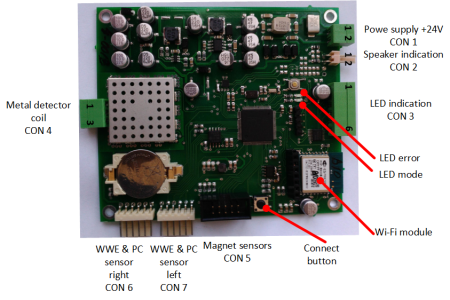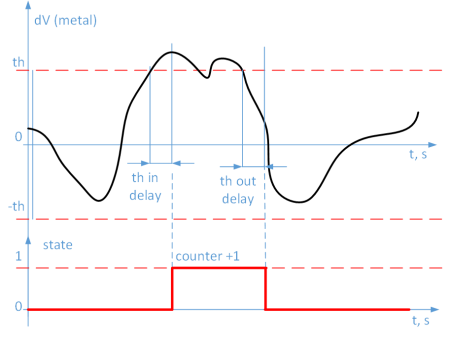Difference between revisions of "Metal detector configuration"
From Awesome Baozam
(→CON4: metal detector winding connection) |
|||
| Line 16: | Line 16: | ||
|Pin 3||Coil con 2 | |Pin 3||Coil con 2 | ||
|} | |} | ||
| + | * see CON4 position on Figure bellow. | ||
[[File:Combie manual board 11.png|thumb|frame|left|450px|Fig. 2: Management Board Connectors]] | [[File:Combie manual board 11.png|thumb|frame|left|450px|Fig. 2: Management Board Connectors]] | ||
Revision as of 10:19, 11 April 2017
The recommended configuration of the metal detector winding is shown in Figure 1.
The recommended winding of the metal detector should contain two concentric turns of a stranded wire with a cross section of 0.25 .. 1 mm2. The ends of the winding (Coil 1, 2) must be twisted with each other to reduce the effect of external electromagnetic radiation.
In general, the winding can be of arbitrary shape, configuration, and contain one or more turns. The parameters of the winding wiggle on the frequency of the metal detection circuit, the geometric dimensions of the winding affect the sensitivity in the detection of metal.
CON4: metal detector winding connection
| Pin 1 | Coil 1 |
| Pin 2 | N.C. |
| Pin 3 | Coil con 2 |
- see CON4 position on Figure bellow.
"metal" parameters group
The system reacts to a moving metal in the area of the metal detector winding
- dV - the response of the system to the metal
- th - sensitivity detection setting. The parameter values are selected based on the noise level (0.00005 .. 0.0025)
- period avr - a rough estimate of the period of oscillations in the circuit (in the system clock cycles 50..600)
- period min (ticks) - the minimum period of oscillations in the loop. For normal operation of the metal detector, it is necessary to fulfill the condition: period min < (period avr + 20..100)
- buffer size - the size of the history buffer for analysis (100 - corresponds to 1 second maximum value 250, minimum 10)
- buffer window - analysis window (50 - corresponds to 0.5 sec). The buffer size / buffer window ratio affects the speed sensitivity of the metal.
- th in delay & th out delay - time setting for detection when dV is exceeded above th and at detection loss at dV is less than th.
- state - the state of metal detection.
- counter - the the lifetime metal events counter.


